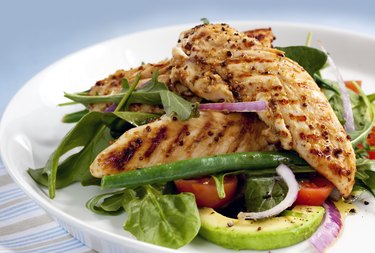
When you're young, you may not give nutrition much thought. But what you eat as a young adult can affect your energy, your appearance and your health. It's important that you eat a variety of foods from all the food groups so that you get all the essential nutrients your body needs to function at its best. So put down the energy drink and vitamin water, and instead fill your plate with nutrient-rich fruits, vegetables, whole grains, lean proteins and low-fat dairy foods.
Calories for a Healthy Weight
Video of the Day
Good nutrition starts with calories because of the role it plays in helping you manage your weight. Maintaining a good weight throughout the course of your life improves your overall health and quality of life. How many calories you need to eat each day depends on your gender, age and activity level. Young adult men between the ages of 19 and 30 can maintain a healthy weight consuming 2,400 to 3,000 calories a day, while women in the same age range can maintain a healthy weight consuming 1,800 to 2,400 calories a day.
Video of the Day
Whole Grains for Energy
Whether you're going to school or just starting your career, you need energy to get you through all that life throws at you. The carbohydrates in grains give your body that energy. To maximize the nutritional benefit, most of your grain choices should be whole grains, such as whole-wheat bread, brown rice and oatmeal. Whole grains are a good source of fiber, B vitamins, iron, magnesium and selenium. The B vitamins in the whole grains help extract the energy from the food you eat. You need at least six servings of grains a day, and at least half your grain servings should come from whole grains.
Fruits and Vegetables
Fruits and vegetables are rich in vitamins C, K and A, folate, potassium, magnesium and fiber. Including more fruits and vegetables in your diet not only helps you meet your nutrient needs but also helps you maintain a healthy weight. How many fruits and vegetables you need to eat depends on your calorie needs and ranges from 1 1/2 to 2 1/2 cups of fruit and 2 1/2 to 4 cups of vegetables every day. You can meet your daily needs by filling half your plate with fruits and vegetables and making them your first choice for snacks.
Protein for Muscles
Your body does need protein to make muscle, but most young adults get more than two times the amount of protein that they need, according to WellStar Health System. Depending on your calorie needs, you only need 5 to 7 ounces of protein foods a day. Save calories and limit saturated fat intake by including leaner sources such as lean red meats, poultry and fish. It's important to include nonmeat sources of protein, such as beans, nuts and seeds, in your diet to vary your nutrient intake. In addition to providing protein, these foods also contain fiber, healthy fats and essential vitamins and minerals.
Don't Skimp on Milk
Milk and other dairy foods such as yogurt and cheese are good sources of calcium and vitamin D, both important nutrients for bone health. Even though you may have already reached your adult height, your bones are still growing and gaining strength, and you reach peak bone mass between the ages of 25 and 30. For better health, include three servings of low-fat or nonfat dairy foods a day, with one serving equal to 1 cup of nonfat milk or 1.5 ounces of low-fat cheese.
- Wellstar: Young Adults: Nutrition
- Weight-Control Information Network: Take Charge of Your Health: A Guide for Teenagers
- U.S. Department of Agriculture: 2010 Dietary Guidelines for Americans
- Centers for Disease Control and Prevention: Protein
- MedlinePlus: B Vitamins
- American Academy of Orthopedic Surgeons: Healthy Bones at Every Age
- KidsHealth: Feeling Too Tall or Too Short